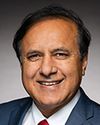Look, it's a great question. A lot of people who are here in Canada—not just asylum seekers, by the way—who are living on a temporary status would like to become permanent residents. Having certainty in what those pathways look like is really important. In order to do that, we need to continue to increase our immigration ambition, which I believe is a good thing for both economic and demographic reasons, but it can also be for compassionate reasons. Smoothing the pathway after a person receives protected person status to permanent residency is one thing that we would be able to do to make life easier, particularly because people who achieve protected person status do not automatically become entitled to be reunified with their families.
Another example would be making sure that we're investing in the asylum system so that people have timely decision-making and they're not left wondering what their status would be, as well as continuing to work with different levels of government at the provincial or municipal levels to make sure that when a person is here going through the process, they're not without a place to sleep or a roof over their head, and they have their basic needs, such as health care, taken care of.
There are a number of elements we can do to make sure that our system of migration and asylum is more compassionate. Of course, I don't have a monopoly on good ideas. If the committee arrives at additional recommendations, I would be more than happy to consider them in good faith.




